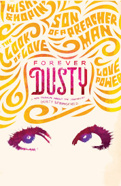Kirsten Holly Smith on Portraying ‘Soulful, Sultry’ Dusty Springfield in Forever Dusty
About the author:
Sometimes an actress seems destined to play a particular role. In the case of Kirsten Holly Smith, that role is 1960s “blue-eyed soul” singer Dusty Springfield, and Smith has spent the last six years developing the biographical musical that became Forever Dusty. In addition to writing the script with Jonathan Vankin, Smith sings hits such as “Son of a Preacher Man” and “The Look of Love,” while giving the audience a fascinating look at the private life of this influential talent. In an essay for Broadway.com, the actress explains her abiding fascination with Springfield and how she guided Forever Dusty to its off-Broadway bow at New World Stages.
![]()
“The only one who could ever reach me was the sweet talkin’ Son of a Preacher Man.”
My love of Dusty Springfield began when I first listened to Dusty in Memphis and heard that voice, that sound! Where did it come from? That soulful, sultry, passionate yet vulnerable voice. I immediately identified with her and knew that I needed to explore the roots of Dusty’s voice. I felt like I knew exactly what she was feeling when she sang her songs, that maybe it was the same feeling I had when I sang. I began listening to her music and also learning whatever I could about her. I quickly found that her life story was as moving and emotionally powerful as her singing. I came to believe that I needed to get closer to Dusty, somehow, to channel her spirit by singing her songs and telling her story.
I was drawn to Dusty Springfield not only by her music, but by what she stood for in her life. She always insisted that she was “not political,” but she never backed down from what she believed. She traveled to apartheid-era South Africa for a series of concerts where she flatly refused to perform for segregated audiences—a direct violation of South Africa’s laws. They put her under house arrest and fed her “tomato sandwiches for days!” It was a huge scandal in England, and she was raked over the coals by the press.
She identified passionately with American soul music, which in the early ’60s was not yet popular or accepted in England. Dusty, almost single-handedly, started a “Motown Invasion” of Great Britain when she hosted a nationally televised concert featuring The Supremes, Little Stevie Wonder, Martha Reeves and the Vandellas and others. Dusty got onstage and sang right along with them, something unheard of in that era. In many ways, this “invasion” of Britain by the America soul sound was as important as the “British Invasion” was here in the States. It changed an entire generation, musically and culturally.
Those were only a couple of the most visible stands that Dusty took, at great risk to her career and reputation. She was a powerful woman of powerful convictions whose story deserved to be told.
I started this journey the best way I knew how: by singing. I learned some of my favorite Dusty songs—“Son of a Preacher Man,” “Breakfast in Bed,” “Just a Little Lovin’” and a few others—and I would show up at open mic at The Gardenia Club, a beautiful cabaret in West Hollywood, CA. I sang the Dusty songs. Just as importantly, I began to meet people who knew and remembered Dusty from her time in Los Angeles in the 1970s and ’80s.
As I continued to learn her songs, I also started to write monologues in her voice, or what I imagined to be her voice, telling her story. I was at the screenwriting department at the University of Southern California at the time, so I was around some of the most expert storytellers in the country, which was a great help and inspiration to me.
Being at USC also produced another unexpected blessing. They offered an arts grant for which students and staff were eligible. I applied with my Dusty project—and got it! That led to a one-night workshop performance of what was then a one-woman show. It took me about eight months to bring the show together for that single evening. And it was very, very different from what, six years later, became Forever Dusty. But once I did that show, I knew there was something in the story and the music that strongly affected the audience. They were completely moved by it. I knew we had to keep going.
Next, we had the great fortune of the show being co-produced by Jorja Fox and The L.A. Gay & Lesbian Center’s Renberg Theatre at The Lily Tomlin/Jane Wagner Cultural Arts Center. I knew that New York was the final frontier for theater and did everything I could to keep the train barreling forward. It is a dream come true for Forever Dusty to open and run at New World Stages here in New York.
It’s been a long and often challenging journey that started with that first listen to Dusty in Memphis. Like Dusty herself, I’ve faced some imposing and sometimes scary obstacles along the way. But I have always been motivated by Dusty Springfield and her incredible story. The chance to tell it eight times per week is the most exciting opportunity I’ve ever had. I can only hope that Dusty is watching, too, and that she is proud.
